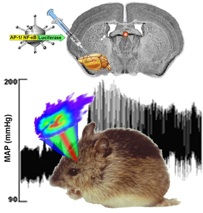Role of redox-mediated activation of NFkB and AP-1 in neurogenic hypertension
- The overarching hypothesis of these studies is that brain Ang-II-dependent hypertension and related autonomic dysfunction are caused by sustained alterations in the function of neurons in key CNS circuits that are, ultimately, encoded by changes in gene transcription.
- Given our recent findings that redox signaling in the CNS plays a primary role in the long-term effects of Ang-II on blood pressure and sympathetic outflow, coupled with evidence that NFB and AP-1 are important redox-sensitive transcription factors (TF) in CNS neurons, we are addressing the hypothesis that redox-mediated activation of NFB and AP-1 in key CNS circuits are causative molecular events in the pathogenesis of several models of neurogenic hypertension including "slow-pressor" Ang-II hypertension and 2K1C renovascular hypertension.
- We are testing this hypothesis by coupling highly selective genetic modulation of TF activation and oxidant-related molecules with long-term integrative analysis of neuro-cardiovascular function in vivo.

Xenogen bioluminescent and fluorescent imaging system.

Targeted delivery of adenoviruses encoding for AP-1- or NFkB-driven luciferase to cardiovascular regulatory control nuclei.

Bioluminescent imaging of AP-1 activation in mouse brain during "slow-pressor" Ang-Ii infusion.


